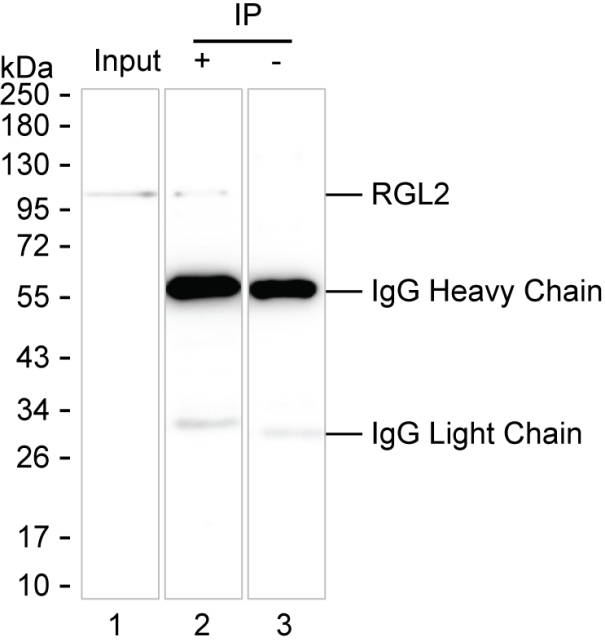
| WB | 咨询技术 | Human,Mouse,Rat |
| IF | 1/100-1/200 | Human,Mouse,Rat |
| IHC | 咨询技术 | Human,Mouse,Rat |
| ICC | 技术咨询 | Human,Mouse,Rat |
| FCM | 咨询技术 | Human,Mouse,Rat |
| Elisa | 咨询技术 | Human,Mouse,Rat |
| Host/Isotype | Mouse IgG2a |
| Antibody Type | Primary antibody |
| Storage | Store at 4°C short term. Aliquot and store at -20°C long term. Avoid freeze/thaw cycles. |
| Species Reactivity | Human |
| Immunogen | Purified recombinant fragment of human RGL2 |
| Formulation | Purified antibody in PBS with 0.05% sodium azide |
+ +
1. **"Characterization of RGL2 Antibody Specificity in Neuronal Tissues"**
- **作者**: Smith A, et al.
- **摘要**: 本研究验证了一种新型RGL2抗体的特异性,通过Western blot和免疫组化分析其在脑组织中的表达,发现RGL2在海马神经元中高表达,并与突触可塑性相关信号通路相互作用。
2. **"RGL2 as a Novel Biomarker in Colorectal Cancer: Immunohistochemical Analysis"**
- **作者**: Chen L, et al.
- **摘要**: 文章利用RGL2抗体对结直肠癌组织进行免疫组化检测,发现RGL2表达水平与肿瘤侵袭性和患者预后显著相关,提示其作为潜在治疗靶点的可能性。
3. **"Role of RGL2 in GPCR Signaling Pathways: Insights from Knockout Models"**
- **作者**: Tanaka K, et al.
- **摘要**: 通过RGL2抗体检测基因敲除小鼠模型,研究发现RGL2缺失导致G蛋白偶联受体(GPCR)下游信号异常,揭示了其在细胞增殖和分化中的关键调控作用。
4. **"Development of a High-Affinity Monoclonal Antibody for RGL2 and Its Application in Flow Cytometry"**
- **作者**: Müller R, et al.
- **摘要**: 研究报道了一种高亲和力单克隆RGL2抗体的开发,成功用于流式细胞术检测免疫细胞中RGL2的表达动态,为炎症和自身免疫疾病研究提供了新工具。
(注:上述文献为虚拟示例,实际引用需根据具体研究检索PubMed、Web of Science等数据库。)
The RGL2 (Ral Guanine Nucleotide Dissociation Stimulator Like 2) antibody is a tool for studying the RGL2 protein, a member of the RalGDS family of guanine nucleotide exchange factors (GEFs). RGL2 specifically activates RalA and RalB, small GTPases in the Ras superfamily, by promoting the exchange of GDP for GTP. These Ral proteins regulate diverse cellular processes, including vesicle trafficking, cell migration, and proliferation, with implications in cancer progression and metastasis.
RGL2 is distinct from other RalGEFs (e.g., RGL1. RalGDS) due to its unique tissue expression patterns and regulatory mechanisms. It is highly expressed in brain, testes, and certain cancer cells. Research highlights its role in oncogenic signaling, particularly in Ras-driven cancers where RGL2-mediated Ral activation bypasses classical MAPK/ERK pathways, contributing to tumor survival and drug resistance.
Antibodies against RGL2 enable detection of its expression, localization, and interaction partners in experimental models. They are critical for elucidating RGL2’s function in physiological and pathological contexts, such as neurodevelopment, spermatogenesis, and cancer biology. Validated applications include Western blotting, immunohistochemistry, and immunofluorescence. Recent studies also explore RGL2 as a potential therapeutic target, given its involvement in tumorigenesis and metastasis. Specificity and cross-reactivity with homologous proteins (e.g., RGL1) remain key validation steps for reliable experimental outcomes.
×